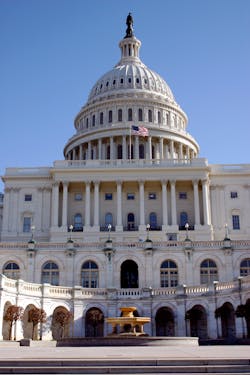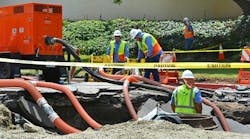Water Utlities Urge Passage of WIFIA Infrastructure Solution
More than 170 water utility leaders from 47 states will take to Capitol Hill to urge passage of legislation that would create a Water Infrastructure Finance and Innovation Authority (WIFIA) to confront America’s growing water infrastructure challenge.
The delegates are part of the Water Matters! Fly In, an event sponsored by the American Water Works Assn. (AWWA) and the Water Environment Federation. In addition to supporting WIFIA, utility leaders will advocate for the protection of water infrastructure bonds and the affordability of federal water mandates.
WIFIA would make low-interest federal loans available for large water and wastewater infrastructure projects. A WIFIA pilot program is already included in the U.S. Senate Water Resources Development Act (S.601), and water leaders are urging introduction of similar legislation in the U.S. House of Representatives.
“The time is right to confront the water infrastructure challenge with innovative solutions,” said AWWA Executive Director, David LaFrance. “We are closer than ever to bi-partisan legislation that strikes the right balance between local responsibility and federal assistance. WIFIA would go a long way toward helping local communities address their water infrastructure needs.”
WIFIA would complement existing state revolving loan fund programs, which already provide critical support for both drinking water and wastewater utilities. Delegates will ask their elected representatives to ensure these programs are funded at 2012 levels.
Under the Water Resources Development Act, WIFIA would have the authority to:
- Provide direct loans, loan guarantees and lines of credit for large water infrastructure projects, with a minimum loan size of $20 million. That ensures that WIFIA complements, but does not replace, the SRF program by specifically focusing on larger projects that may be unable to access capital through the SRFs.
- Provide state authorities with the ability to apply for a WIFIA loan to fund an aggregation of smaller projects. This allows states to utilize WIFIA to leverage existing SRF resources.
AWWA last year published a report that showed that repairing and expanding existing water infrastructure would cost more than $1 trillion over the next 25 years, and wastewater needs are believed to be similar. To help meet challenge, the delegates are also asking their elected leaders to:
- protect the federal tax exemption of municipal bond interest,
- restore and protect promised payments to the issuers of Build America Bonds and
- remove water projects from the state volume cap on Private Activity Bonds.
“While communities are best served by utilities that are self-sustaining through local rates and charges, confronting the water infrastructure challenge will require a variety of financing tools,” LaFrance said. “At the end of the day, the beneficiaries of these smart financing solutions are all of us who pay for water service.”
Source: American Water Works Assn.


